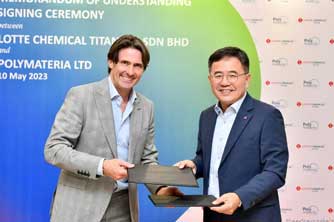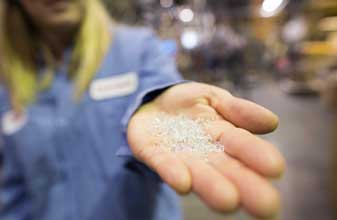Green tie-ups: Lotte/Polymateria to commercialise biodegradeable resin in Malaysia; Eastman secures feedstock for US$1 bn recycling facility in France

Lotte Chemical Titan Holding Bhd’s (LCT) unit Lotte Chemical Titan (M) Sdn Bhd has tied up with British biotech company Polymateria Ltd to commercialise Resin+, a biodegradeable resin.
The five-year partnership is part of LCT’s corporate vision to manage climate change issues, minimise the environmental impact of its business operations, and provide sustainable solutions for customers, said LCT CEO Park Hyun Chul.
He added that zero change or input is required to package the new Resin+ into the manufacturing stage for the creation of polyolefins, adding that the group will introduce this new specialty product to clients soon.
Meanwhile, Polymateria CEO Niall Dunne said the new material creates no microplastics, and decomposes within two years.
“We work across the value chain. But in Malaysia with Lotte, we are focused on the downstream to the packaging converter and also the brand, so that it is communicated to consumers in the right way. The packaging companies know how to use the new Resin+ technology we have developed,” Dunne added.
He said that Polymateria is also strengthening its position in the Malaysian market by actively testing its products.
He also said the British Standards Institution’s BSI PAS 9017 standard on biodegradable plastics had been recognised in the Malaysia Plastics Sustainability Roadmap and National Marine Litter Policy and Action Plan formulated by the previous Ministry of Environment and Water.

Meanwhile in other news, US materials firm Eastman says it has secured a significant amount of feedstock needed for its planned molecular recycling facility in Port Jerome sur Seine, Normandy, France. With an investment of US$1 billion, the planned facility will become the world’s largest material-to-material molecular recycling plant.
Citeo, the leading Producer Responsible Organisation (PRO) in France, recently announced that Eastman, in a commercial partnership with Paprec, France’s leading integrated waste management company, has been selected to receive a significant amount of feedstock for the methanolysis facility in Normandy. The Citeo agreement to secure French household waste has provided Eastman with a strong foundation for securing French-sourced waste for its project in France.
Eastman also shared it has reached an additional agreement with Interzero, an innovation leader in plastics recycling with the largest sorting capacity in Europe, for an additional 25,000 tonnes of waste in addition to the 20,000 tonnes from a previous agreement announced last year.
Another agreement with a leading company in the waste management and recycling eco-system was reached at the end of last year. This agreement, adding approximately 30,000 tonnes of waste, allows geographic coverage in strategic waste supplies.
Eastman recently shared the decision to build the facility in two phases which will allow the facility to recycle over 200,000 tonnes/year of hard-to-recycle polyester waste, most of which is currently landfilled or incinerated today. Due to the updated plans, the company now expects phase 1 of the project to be mechanically complete in 2026 and process 100,000 tonnes.
“Going with a phased approach for the project allows for design changes in the facility to recycle more plastic waste by moving from the initial estimates of approximately 160,000 tonnes to over 200,000 tonnes/year,” said JP Kuijpers, managing director of EMEA and director general of Eastman circular solutions in France.
Eastman will use its proven Polyester Renewal Technology (PRT) in France to recycle hard-to-recycle plastic waste that remains in a linear economy today. The company’s recycling technology allows this hard-to-recycle waste to be broken down into its molecular building blocks and then reassembled to become like new material without any compromise in quality and performance. Eastman's PRT enables the potentially infinite value of materials by keeping them in production, lifecycle after lifecycle. With the technology's highly efficient yield and the renewable energy sources available at the Normandy location, Eastman can transform waste plastic into like new food contact polyesters with lower greenhouse gas emissions than traditional methods.
In addition to this announced plant in France, Eastman is investing in two other molecular recycling plants in the US - Kingsport, Tennessee, and another US site to be announced later this year with an expected combined global investment of approximately US$2.25 billion for all three facilities.
(PRA)
Subscribe to Get the Latest Updates from PRA Please click here
©2023 Plastics and Rubber Asia. All rights reserved.

©2023 Plastics and Rubber Asia. All rights reserved.
Home Terms & Conditions Privacy Policy Webmail Site Map About Us















